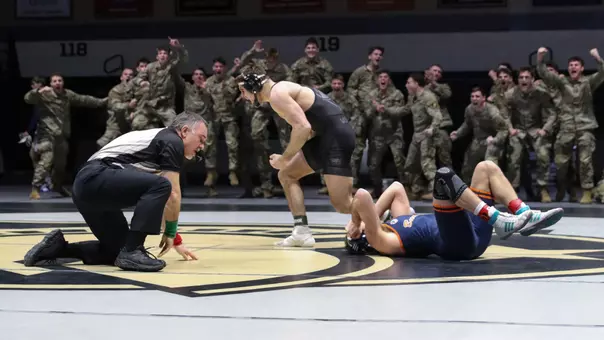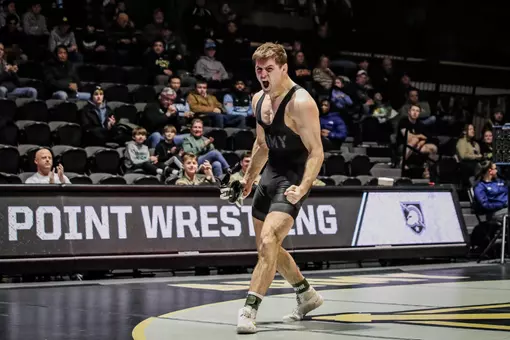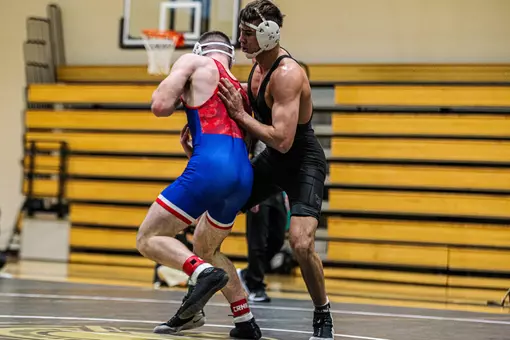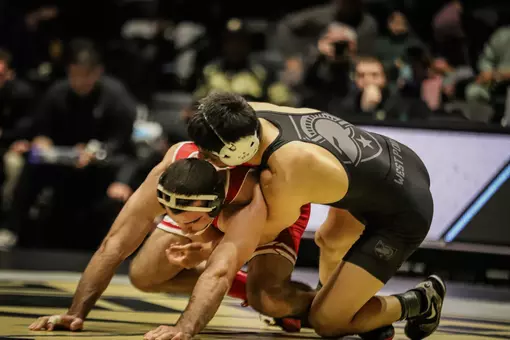Army West Point Athletics
MISSION FIRST: Coming Full Circle
October 20, 2015 | Wrestling, Athletics
Col. Nick Mauldin will always live amongst the greats in Army West Point wrestling history. A poster in the team's Arvin Gymnasium workout facility shows him atop the winners' podium, beaming as he holds his hardware after besting the nation's top-ranked wrestler, who just happened to be a Navy Midshipman.
"Going in there I had wrestled him two times before," recalls Mauldin. "He had beat me both times. The first time, when I was a Plebe, he beat me pretty handily. The second time he took me down in my Yearling year in the last 10 seconds. Going into the Eastern Tournament, he was seeded No. 1 and he was the No. 1 ranked wrestler at 158 pounds in the nation. I wrestled him in the finals and to be able to beat him at the Eastern Intercollegiate Wrestling Association Championships was just incredible."
What he recalls as his proudest moment as a cadet, Mauldin was named the tournament's Most Outstanding Wrestler, in addition to winning bragging rights over his service academy foe.
"It's a memory that I'll never forget," he adds. "I can't remember too many people that I ever wrestled, but that is clearly one that I will always remember."
While Mauldin's success against his Navy counterpart is clear, the Army West Point wrestling team has struggled as of late to capture a "Star" meet win over its top rival. Heading into the 2015 contest, the Black Knights had not seen a victory over the Midshipmen in the "Star" meet since the 1996-97 season.
That changed in 2015 when the Black Knights snapped Navy's 17-year unbeaten streak by earning a 21-10 victory over the Midshipmen in front of 1,004 fans at Christl Arena.
One of those fans: Col. Nick Mauldin.
"I went crazy," Mauldin says. "The 'Supe,' the athletic director, his wife, my kid, we were all in the stands going crazy. We had a blast. That was a huge, huge win. I always say when I do Founders Day that it took me 25 years to see us beat Navy, and to be able to do that right before I left was pretty rewarding."
Mauldin returned to West Point in June 2012 to serve as a regimental tactical officer (RTO) for the United States Corps of Cadets. After 12 months, he was promoted to brigade tactical officer (BTO), a position he held for 14 months before joining the Army Athletic Association as the deputy military athletic director.
In his role with the athletic department, Mauldin received the opportunity to work with and mentor cadet-athletes, having the ability to relate his time as a cadet to the struggles and triumphs of today's Corps of Cadets.
"That's probably the most rewarding thing about West Point is being able to mentor those young men and women," Mauldin says. "As an RTO, I got here three years ago and to see some of those Plebes who are now Firsties or Cows, it's just incredible to see the growth. Usually as the RTO when you saw someone in your office it was probably because they were in trouble, and to see them mature over the 47-month process at West Point, it makes you feel confident that they will succeed and that they're going to be great leaders."
Mauldin reflects on being able to watch the careers of some of Army West Point's top cadet-athletes in wrestler Cole Gracey and gymnast Jesse Glenn. The first seeded Army West Point wrestler in the NCAA Tournament since 2008, Gracey led the 2014-15 squad with 35 wins. Glenn represented the Black Knights as the only Army West Point gymnast to advance into the final rounds of the NCAA Championships, taking ninth on high bar in Oklahoma this spring, in front of a crowd of supporters, including Mauldin. When asked about his favorite moments in the athletic department, Mauldin smiles, easy to quote stories of Army West Point cadet-athletes' accomplishments.
"Clearly, seeing Jesse at nationals, just one away from being an All-American and seeing Cole wrestling at the Southern Scuffle; how he just continually fought to get to that next round to win that next match, and at the end of the tournament he looked like he had been beaten up by 20 people but he was always just smiling," says Mauldin. "I'll always have a picture of his face at the end on the podium ... just the smile on his face to get fifth at a very tough tournament and just loving it."
A unique aspect of Mauldin's role with the Academy was his ability to relate to what the day-to-day struggle of being a cadet-athlete could be like. For most cadets, their four years at West Point is finding a way to survive and make it to the next day, completing military, academic and athletic requirements. The ultimate test of time management skills, cadets are forced to fight every day to make it through the premier leadership institution in the world.
Having the ability to assist in the development of the nation's future leaders is something that Mauldin took to heart. He valued the opportunity to work with cadets who thrive, not only in athletic competition, but academically and militarily, and he relished the chance to help produce graduates who exemplify the pillars of the Academy.
"Every day that I was at West Point I woke up with a smile on my face, knowing that I was there and I was able to do what I did. Being able to finish in (the intercollegiate athletic department) was as rewarding as it could be," adds Mauldin. "I would never have gotten into West Point if it had not been for ODIA (Office of Directorate for Intercollegiate Athletics) recruiting me as a wrestler. I owe a lot to ODIA taking a risk and taking a chance on me, and to be able to finish my last year working in the department has just come full circle."
After spending nearly three years at West Point, Mauldin and his family were given a new assignment and a new journey to Yongsan, Korea.
"My family and I have loved our time (at West Point)," he states. "When I got the opportunity to come here I was asked by my boss, 'Why do you want to come here?' I said, 'I really want to go to West Point so that my kids can see what 'right' looks like.'"
The time spent at West Point afforded Mauldin the opportunity to not only advance his professional career and work at the institution where he got his start, but also provide a culturally enriching experience for his family. The ability to raise a family in an environment in which young men and women are volunteering to serve their nation in a time of war, will be something that he believes his family, and especially his children, will cherish forever.
"This is where I started," explains Mauldin. "I thought this would possibly be my last assignment and thought there would be no better place to end my military career than where it started. While it's not my last, it's pretty close."
While Korea will be a drastic change for the Mauldin family, they're ready to use the opportunity to grow and expand their knowledge.
"I would say the Number One thing I'm looking forward to is the food," he jokes. "Yongsan, the way it's been explained to me, is kind of like Central Park in New York City. You have this military base that looks kind of normal and Americanized and then as soon as you step off you're in a big city with skyscrapers. So, we're looking forward to getting to see that and getting to experience that. We were stationed in Norway for three years and everyone really enjoyed that time. It's an experience that kind of opens your eyes up to get to see that there's a lot out there. It's not just about us, sometimes you've got to get out there and experience."
Anticipating his trek to Korea as his final mission with the United States Army, Mauldin is ready to again go back to a place where he called home, this time not at West Point, but on the family farm in Oklahoma.
"That's Number One on my list right now … to get to spend some good, quality time with my family," he says. "I owe all of my success to my mom and dad. I look at what they did for me and my brothers and the time that they spent developing us into leaders and developing us into pretty good wrestlers. I would love to get back, and, as they get into their 'golden years,' spend some time with them and let them see the kids."
"Going in there I had wrestled him two times before," recalls Mauldin. "He had beat me both times. The first time, when I was a Plebe, he beat me pretty handily. The second time he took me down in my Yearling year in the last 10 seconds. Going into the Eastern Tournament, he was seeded No. 1 and he was the No. 1 ranked wrestler at 158 pounds in the nation. I wrestled him in the finals and to be able to beat him at the Eastern Intercollegiate Wrestling Association Championships was just incredible."
What he recalls as his proudest moment as a cadet, Mauldin was named the tournament's Most Outstanding Wrestler, in addition to winning bragging rights over his service academy foe.
"It's a memory that I'll never forget," he adds. "I can't remember too many people that I ever wrestled, but that is clearly one that I will always remember."
While Mauldin's success against his Navy counterpart is clear, the Army West Point wrestling team has struggled as of late to capture a "Star" meet win over its top rival. Heading into the 2015 contest, the Black Knights had not seen a victory over the Midshipmen in the "Star" meet since the 1996-97 season.
That changed in 2015 when the Black Knights snapped Navy's 17-year unbeaten streak by earning a 21-10 victory over the Midshipmen in front of 1,004 fans at Christl Arena.
One of those fans: Col. Nick Mauldin.
"I went crazy," Mauldin says. "The 'Supe,' the athletic director, his wife, my kid, we were all in the stands going crazy. We had a blast. That was a huge, huge win. I always say when I do Founders Day that it took me 25 years to see us beat Navy, and to be able to do that right before I left was pretty rewarding."
Mauldin returned to West Point in June 2012 to serve as a regimental tactical officer (RTO) for the United States Corps of Cadets. After 12 months, he was promoted to brigade tactical officer (BTO), a position he held for 14 months before joining the Army Athletic Association as the deputy military athletic director.
In his role with the athletic department, Mauldin received the opportunity to work with and mentor cadet-athletes, having the ability to relate his time as a cadet to the struggles and triumphs of today's Corps of Cadets.
"That's probably the most rewarding thing about West Point is being able to mentor those young men and women," Mauldin says. "As an RTO, I got here three years ago and to see some of those Plebes who are now Firsties or Cows, it's just incredible to see the growth. Usually as the RTO when you saw someone in your office it was probably because they were in trouble, and to see them mature over the 47-month process at West Point, it makes you feel confident that they will succeed and that they're going to be great leaders."
Mauldin reflects on being able to watch the careers of some of Army West Point's top cadet-athletes in wrestler Cole Gracey and gymnast Jesse Glenn. The first seeded Army West Point wrestler in the NCAA Tournament since 2008, Gracey led the 2014-15 squad with 35 wins. Glenn represented the Black Knights as the only Army West Point gymnast to advance into the final rounds of the NCAA Championships, taking ninth on high bar in Oklahoma this spring, in front of a crowd of supporters, including Mauldin. When asked about his favorite moments in the athletic department, Mauldin smiles, easy to quote stories of Army West Point cadet-athletes' accomplishments.
"Clearly, seeing Jesse at nationals, just one away from being an All-American and seeing Cole wrestling at the Southern Scuffle; how he just continually fought to get to that next round to win that next match, and at the end of the tournament he looked like he had been beaten up by 20 people but he was always just smiling," says Mauldin. "I'll always have a picture of his face at the end on the podium ... just the smile on his face to get fifth at a very tough tournament and just loving it."
A unique aspect of Mauldin's role with the Academy was his ability to relate to what the day-to-day struggle of being a cadet-athlete could be like. For most cadets, their four years at West Point is finding a way to survive and make it to the next day, completing military, academic and athletic requirements. The ultimate test of time management skills, cadets are forced to fight every day to make it through the premier leadership institution in the world.
Having the ability to assist in the development of the nation's future leaders is something that Mauldin took to heart. He valued the opportunity to work with cadets who thrive, not only in athletic competition, but academically and militarily, and he relished the chance to help produce graduates who exemplify the pillars of the Academy.
"Every day that I was at West Point I woke up with a smile on my face, knowing that I was there and I was able to do what I did. Being able to finish in (the intercollegiate athletic department) was as rewarding as it could be," adds Mauldin. "I would never have gotten into West Point if it had not been for ODIA (Office of Directorate for Intercollegiate Athletics) recruiting me as a wrestler. I owe a lot to ODIA taking a risk and taking a chance on me, and to be able to finish my last year working in the department has just come full circle."
After spending nearly three years at West Point, Mauldin and his family were given a new assignment and a new journey to Yongsan, Korea.
"My family and I have loved our time (at West Point)," he states. "When I got the opportunity to come here I was asked by my boss, 'Why do you want to come here?' I said, 'I really want to go to West Point so that my kids can see what 'right' looks like.'"
The time spent at West Point afforded Mauldin the opportunity to not only advance his professional career and work at the institution where he got his start, but also provide a culturally enriching experience for his family. The ability to raise a family in an environment in which young men and women are volunteering to serve their nation in a time of war, will be something that he believes his family, and especially his children, will cherish forever.
"This is where I started," explains Mauldin. "I thought this would possibly be my last assignment and thought there would be no better place to end my military career than where it started. While it's not my last, it's pretty close."
While Korea will be a drastic change for the Mauldin family, they're ready to use the opportunity to grow and expand their knowledge.
"I would say the Number One thing I'm looking forward to is the food," he jokes. "Yongsan, the way it's been explained to me, is kind of like Central Park in New York City. You have this military base that looks kind of normal and Americanized and then as soon as you step off you're in a big city with skyscrapers. So, we're looking forward to getting to see that and getting to experience that. We were stationed in Norway for three years and everyone really enjoyed that time. It's an experience that kind of opens your eyes up to get to see that there's a lot out there. It's not just about us, sometimes you've got to get out there and experience."
Anticipating his trek to Korea as his final mission with the United States Army, Mauldin is ready to again go back to a place where he called home, this time not at West Point, but on the family farm in Oklahoma.
"That's Number One on my list right now … to get to spend some good, quality time with my family," he says. "I owe all of my success to my mom and dad. I look at what they did for me and my brothers and the time that they spent developing us into leaders and developing us into pretty good wrestlers. I would love to get back, and, as they get into their 'golden years,' spend some time with them and let them see the kids."
Players Mentioned
Army vs Lehigh
Sunday, February 06
Wrestling vs. Navy
Friday, February 12
Wrestling vs. Hofstra
Sunday, January 17
Wrestling vs. Lehigh
Friday, January 31





